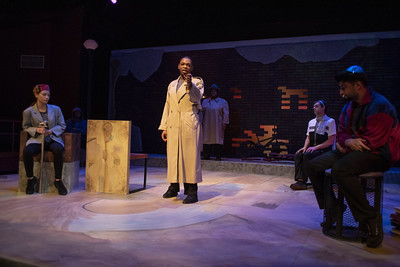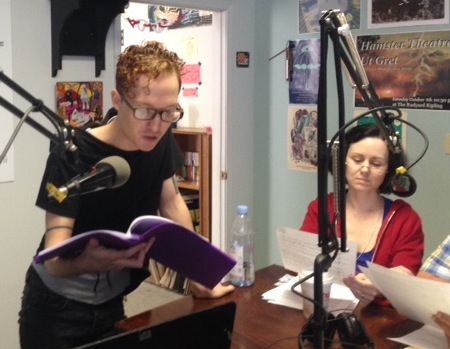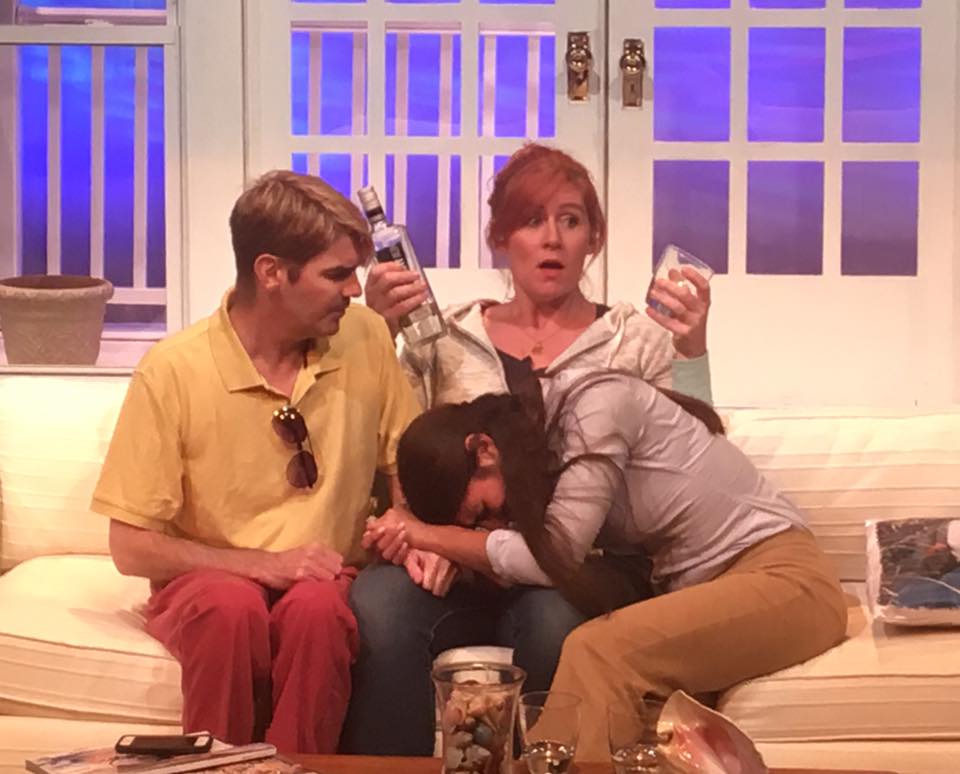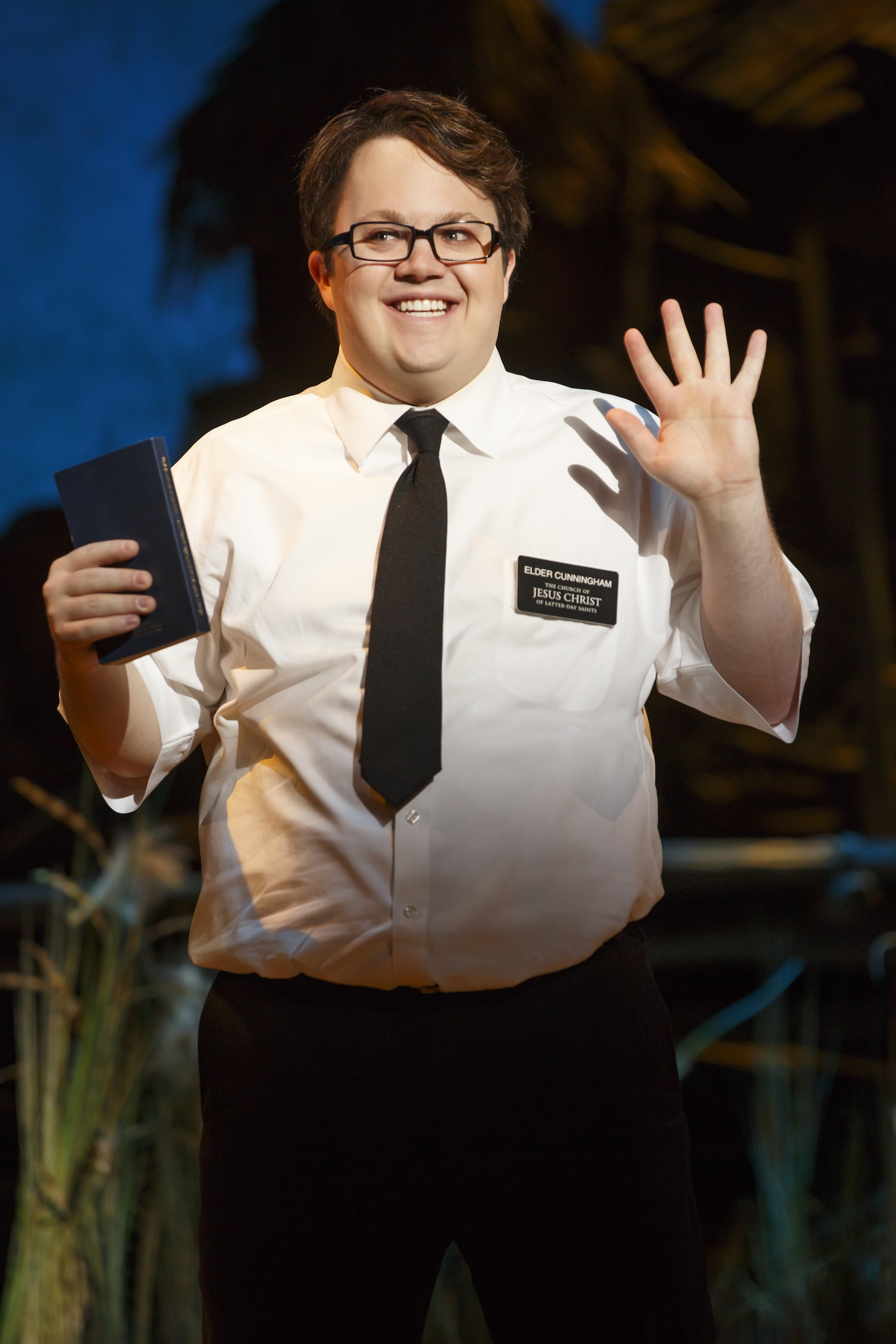Chasidy Moore, Brandi Threatt, Candace Spencer, Alex Gordon, & Manuel Francisco Viveros. Photo: Tom Fougerousse for University of Louisville
Fires in the Mirror
By Anna Deavere Smith
Directed by J. Ariadne Calvano
Review by Keith Waits
Entire contents are copyright © 2019 by Keith Waits. All rights reserved.
A stylized urban landscape with Public Enemy’s “Fight the Power” echoing off the surfaces. It is the opening of Spike Lee’s Do The Right Thing and director J. Ariadne Calvano deliberately sample the scene in her staging of Anna Deavere Smith’s Fires in the Mirror. It is an audacious choice to crib so iconic a work of popular culture at the very start of a play, and you only get away with it if you follow it with a strong, independent vision of your own.
Yet Calvano has taken Smith’s one-person show and cast it with an eight-member ensemble of student actors sharing the 26 characters with such ease that one wonders how it was possible for a single performer to pull it off.
In the Crown Heights neighborhood of NYC in August 1991, riots developed after a car driven by a Chabad Jewish man accidentally kills a young Black youth. The incident was exacerbated by the response of police and emergency services personnel so that, later that same day, a group of African Americans attacked a young Jewish scholar who died from his injuries at the hospital.
The playwright through an extensive series of interviews explored the polarizing situation with people in and around the circumstance, a search for complex and contradictory truths resulting in a nuanced work of deep feeling. Fires are recognized as an early example of verbatim theatre, a documentary form in which the unvarnished words of real people are the text.
Calvano uses the ensemble to create moments of confrontation and joining that would be difficult to imagine with only one body in the space. She moves her actors off and on the stage with gestures of exchange that unify the narrative during the early, establishing monologues. Descriptions of the events only occur after several characters build context for the urban environment and the history of racial and social tensions, director George C. Wolfe, Angela Davis,
Once those descriptions come, the subjectivity of the first-hand accounts is startling. Essential details stand in opposition to one another, suggesting the possibility of other perspectives and questioning the very idea of objectivity. However much we venerate the idea of objective truth, it can prove to be damnably elusive.
The ensemble members are remarkably consistent in the quality of performance and boast some fine dialect work (directed by Rachel Carter & Terry Tocantins), which is especially notable in a scenario that relies on deconstructing the mixture of ethnicities involved: Caribbean-American, Guyanese, Lubavitcher Jewish, Australian…exploding the simplistic Black/Jewish conflict of the headlines.
An interesting interactive element is introduced into the design work, one in which the projected questions are posed that the audience members can answer in the moment by text. The responses are then pulled into the projection, evolving into a fluid word diagram. Describe NYC in one word, Where do you feel safe? Kevin Gawley managed this key ingredient, and it integrates nicely with Megan Meyer’s setting. Tyler Heir Julia Mathew & Cece Phillips are credited with lights and prop design, and however the credit might be assigned among the three, it was good work. Zhanna Goldentul’s costumes are asked to do less, mostly establishing a neutral foundation that does not interfere in the transitions between so many characters, but a small number of accessories evocatively suggest details of characterization and circumstance.
New York City in the 1980s was the site of several racially charged acts of violence and municipal misconduct that made similar headlines, the chokehold death of Michael Stewart, the shooting of Eleanor Bumpers, the Central Park Five rape case. The program is filled with essential context from dramaturg Janna Segal that helps us understand the time, which, as we watch this production unfold, doesn’t seem so far away.
If things have only become more polarized and divisive in the years since then we can only be grateful for the opportunity Fires in the Mirror gives us to take a harder look at how the world unfolds in infinite shades of gray, and how important it is to not settle for sound-bite mentality.
Featuring Alex Gordon, Lamar Hardy, Chasidy Moore, Junaid Shahzad, Candace Spencer, Tyler Tate, Brandi Threatt, & Manuel Francisco Viveros.
Fires in the Mirror
November 7-17, 2019
Post-show panel discussions led by dramaturg Dr. Janna Segal
November 8 -Theatre artists share how Smith’s work has influenced them. Panelists include Dr. Calvano; Janelle R. Dunn, learning and creative engagement associate at Actors Theatre of Louisville; Diana Grisanti, co-artistic director of Theatre 502 and Keith McGill, comedian, actor and Actors Theatre of Louisville teaching artist.
November 14 – How the play resonates with Louisville today. Confirmed panelists include Rabbi David Ariel-Joel from The Temple; Cathy Hinko, executive director of the Metropolitan Housing Coalition; and Marian Vasser, UofL Director of Diversity Education and Inclusive Excellence.
All performances start at 7:30 p.m. with 3 p.m. Sunday matinees. Tickets are $20 for general admission and $15 for seniors and students. Season tickets are $50. To order tickets or for more information, call the box office at (502) 852-6814 or visit: http://louisville.edu/theatrearts/productions
University of Louisville Dept of Theater Arts
Thrust Theatre
2314 South Floyd Street
Louisville, KY 40208
louisville.edu/theatrearts
Keith Waits is a native of Louisville who works at Louisville Visual Art during the days, where he is Managing Editor of their Artebella blog, and host of LVA’s Artebella On The Radio on WXOX-FM 97.1/ ARTxFM.com. But spends most of his evenings indulging his taste for theatre, music and visual arts. His work has appeared in LEO Weekly, Pure Uncut Candy, TheatreLouisville, and Louisville Mojo. He is now Managing Editor for Arts-Louisville.com.





